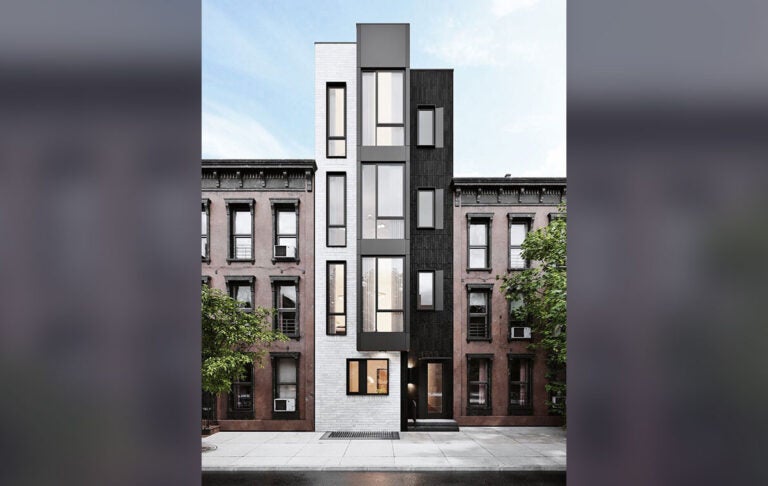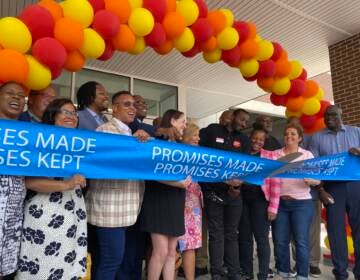How to shape Philly development in 2021
If you want a voice in community development, find avenues to engage beyond the comment threads, writes Camille Boggan.

A rendering by Stamm Development of a five-unit condo project planned for 1513 Christian Street (Stamm Development)
It’s no secret that Philadelphians like to talk trash.
Whether it’s panning a cheesesteak recipe, a quarterback or a neighborhood’s parking style, people are not afraid to get vocal — and that’s a good thing, revealing the passion so many feel for their hometown. But talking smack is not activism. As an urban planning student and resident of a fast-developing area, I fear we are confusing words with action and losing opportunities to shape our communities without realizing it.
A recent thread on a Facebook post shared to a neighborhood group I belong to started with a rendering of a condo-ized rowhouse on the 1500 block of Christian Street, not far from where I live. Much of the criticism revolved around the size of the proposed building and design of the gray and black facade. Its placement next to the historically designated former home of the prominent Black architect Julian Francis Abele felt like an affront to some. The conversation was aggressively negative, with commenters complaining about cheap materials and the “commercial” feel of the unbuilt five-unit condo building. A few days later, the discussion moved to Twitter, inciting another social media debate on whether proximity to a historically designated building was grounds for designating other surrounding structures historic as well.
If constituents have an issue with policies affecting their community, they have every right to organize and advocate on behalf of their needs — and they should advocate. Social media can be a useful vessel for this type of activism, but it is likely to be far more effective if residents are well-organized and present viable alternatives.
All too often, negativity about proposed developments or new bike infrastructure is spread by a select few self-appointed neighborhood defenders on Facebook, NextDoor, and Twitter. This form of opposition is never solution-oriented — it appears designed to incite anger and rarely involves dialogue with people in a decision-making capacity.
There is a vast network of community-led organizations residents can make use of if they want to collectively voice concerns about projects in their neighborhoods. The Philadelphia City Planning Commission established the Registered Community Organization (RCO) program for this very purpose—for communities to give and receive feedback about developments that affect them. These groups are run by volunteer residents who are invested in their neighborhoods and recognize that an organized body is far more effective in producing change than a few angry individual voices. There are also a number of other community groups residents can reach out to or get involved with regarding development projects—neighborhood Community Development Corporations (CDCs), 5th Square, or the Preservation Alliance for Greater Philadelphia, to name a few.
All of these organizations have websites or social media accounts where individuals can reach out to them via phone, email, or private message. If you think local community groups could be more engaged about certain issues, they are often looking for engaged volunteers to be on committees or provide outreach to underrepresented groups. If you are unhappy with the leadership of these organizations, you are welcome to become a member and then run for a leadership position. And if none of those options sound appealing, you can always write or call your local councilmember.
The contention around the 1513 Christian Street project in Graduate Hospital calls forth a discussion about the tension between historic preservation and new development in Philadelphia. Graduate Hospital in particular has an affordable housing problem, having lost hundreds of low-cost rental units between 2000 and 2014. The South of South Neighborhood Association (SOSNA) recognizes this as a real problem and believes they have done well so far to balance a desire for consistent neighborhood aesthetics with the need for more affordable housing units.
In a city where the average age of a home is 93 years old, renovations that are up to code (and possible historic designation standards) are far out of reach for the average potential homebuyer. State historic tax credits are not in abundance, and National Historic Tax credits can’t be used by homeowners. It appears recent proposed legislation to create a preservation fund never advanced and therefore there is no existing mechanism to incentivize homebuyers or developers to renovate residential properties. Simply opposing demolitions without a way to incentivize their renovation will likely lead to residential buildings sitting empty, exacerbating Philadelphia’s affordable housing problem. It seems there is a need for preservation supporters to organize and advocate harder for renovation incentives and financial assistance if they are truly concerned about losing historic housing stock.
SOSNA Board of Directors Chair Nolan Tully noted that there might not be much of a role they can legally play to influence the outcome of the 1513 Christian Street development. The project is a by-right development and is taking advantage of height and density bonuses added in a recently amended inclusionary housing bill. Tully states that the neighborhood association has spoken with Councilman Kenyatta Johnson about potential actions to be taken, but as of now have not taken a formal position. As for how nearby residents can get involved, SOSNA has monthly zoning meetings that interested parties are welcome to attend, and the organization is always looking for engaged volunteers.
Camille Boggan is a current resident of Graduate Hospital and a city planning graduate student at the University of Pennsylvania.

Subscribe to PlanPhilly
WHYY is your source for fact-based, in-depth journalism and information. As a nonprofit organization, we rely on financial support from readers like you. Please give today.







